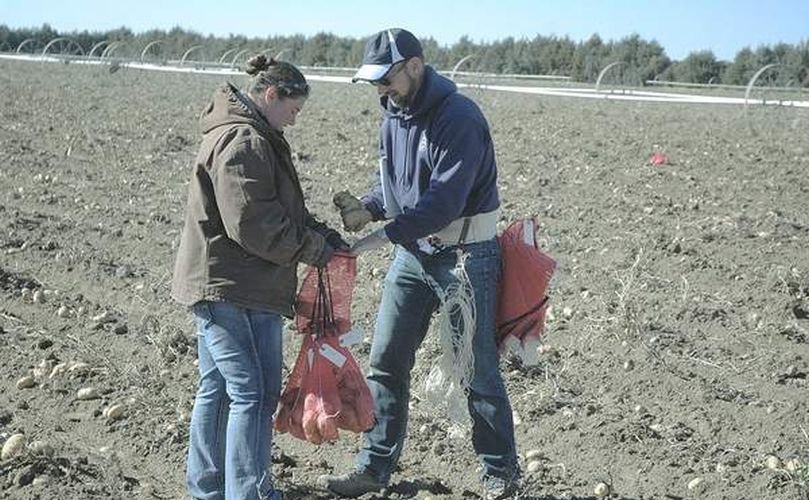Researchers in the pacific North-west breeding program harvested a special block of first-year clones on Sept. 29, screened for their ability to help the industry cope with a quarantined pest.
The block contained a half dozen plants from each of 223 breeding clones resulting from crosses of Western Russet and Eden, a round Scottish variety with known resistance to potato cyst nematode.
Material in the block has been screened for the presence of two genetic markers associated with resistance to the microscopic but highly destructive pest. Joe Kuhl, a University of Idaho associate professor of plant genetics, will also use clones from the plot in genetic mapping research to identify new genes associated with PCN resistance.
Kuhl said he’s midway through a five-year project focused on breeding PCN-resistant russets, funded by USDA’s National Institute of Food and Agriculture. Several fields within a 7-mile radius of Bingham and Bonneville counties in Eastern Idaho have been under quarantine since a type of PCN, called pale cyst nematode, was discovered for the first time in the U.S. in 2006. Affected growers have been calling for PCN-resistant russet varieties.
“The idea is to look for that long russet type,” says Joe Kuhl, a University of Idaho associate professor of plant genetics. “That is a huge problem in the U.S. now because the long russet types don’t have good resistance to PCN.”
Louise-Marie Dandurand, director of UI’s pale cyst nematode program, has evaluated the crosses in a greenhouse to determine how they affect the viability of PCN cysts and eggs.
Rich Novy, the USDA Agricultural Research Service breeder who made the crosses for Kuhl’s project, plans to immediately use the best breeding clones from the PCN-resistant population as parents in his program.
Washington State University agronomist Mark Pavek, who assisted in the field selections, wrote the word “Basin” on the tag of one bag of spuds he saved, explaining his program encourages Aberdeen to keep clones that may appear too skinny for Idaho but could have the ideal shape when grown under Columbia Basin conditions.
But there is a tough selection: only about two per cent of first-year clones are retained.
Source: Potato Pro











